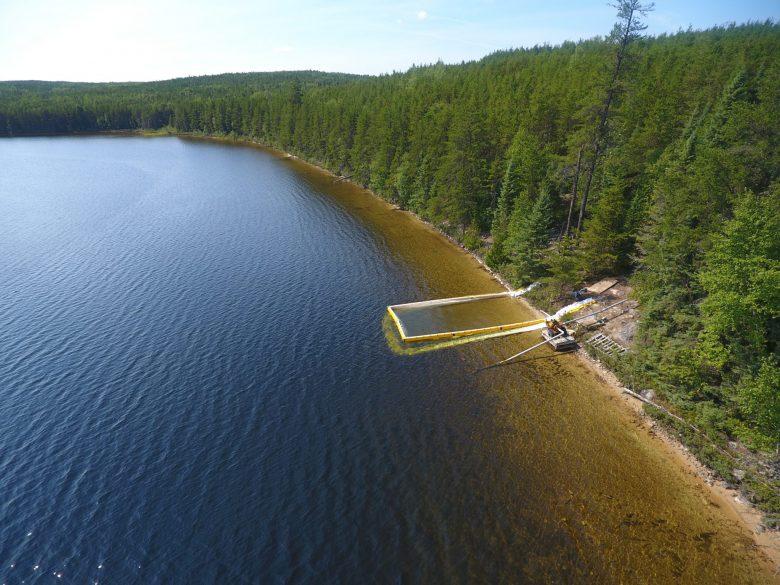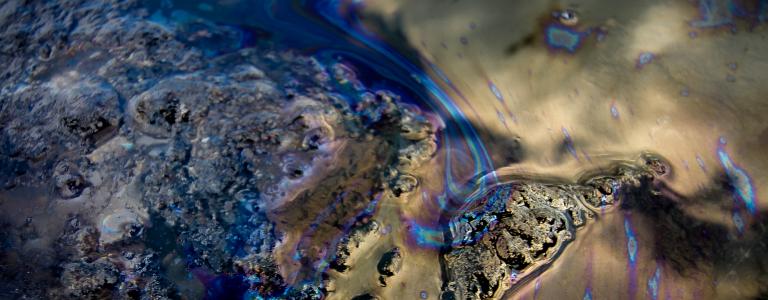Discovering What Oil Spills Do to Fresh Water
Groundbreaking new research into the impacts of diluted bitumen on fresh water systems.
North America has the largest network of energy pipelines in the world, and unfortunately periodic oil spills from pipelines do occur.
Even so, leading and authoritative sources, such as the Royal Society of Canada and the National Academy of Sciences, have identified gaps in our knowledge regarding the impacts of oil spills on freshwater systems.
Given the current situation, a groundbreaking project is taking place at IISD-ELA that will enhance our understanding of what happens when oil enters freshwater systems.
There are three stages of this research.
First, a pilot study using three small (2-m diameter) land-based microcosms has already been completed to examine the chemical and physical behaviour of dilbit in fresh water.

Oil is a complex mixture of chemicals whose nature changes with time in the environment. These changes can affect how easily it can be cleaned up (for example, does the oil remain floating or sink?) and its potential toxicity to freshwater wildlife. This early-stage study provided important preliminary information regarding these changes in fresh water that will help to guide the later phases of the research, which will begin in 2018.
The second stage is a field study. Researchers will use large enclosures (10-m diameter) placed in a lake to examine how diluted bitumen reacts in fresh water over longer periods of time. Researchers will also be directly testing changes in the oil’s toxicity to freshwater bugs, fish and amphibians.
The information from these first two studies will guide a third study, where researchers will examine the most effective methods of cleaning spilled oil from shorelines. Again, only small, contained model spills in an IISD-ELA lake will be used. This study will focus on the shoreline, which is most sensitive to oil and presents the biggest difficulty in terms of cleanup efforts.
You can read more about this research into diluted bitumen and fresh water in this blog post.
In 2019, PBS’ Great Lakes Now show visited the site, and featured our research on oil spills in an episode of their show, ‘Polluting With Purpose,’ and developed an excellent lesson plan, including a simulation of the experiment, for grades 5-8.
Several studies are currently being pursued at the IISD-ELA to address public and regulatory concerns regarding potential environmental effects of oil spills and uncertainty regarding the best cleanup methods following a spill, especially for freshwater environments. One study, led by Drs. Jules Blais (University of Ottawa), Mark Hanson (University of Manitoba) and Diane Orihel (Queen’s University) will examine the ecological impacts of contained diluted bitumen model spills in a freshwater boreal lake. A companion study, led by Dr. Vince Palace (IISD-ELA) will compare the effectiveness of different methods for cleaning spilled oil from shorelines. Both studies are part of a large multidisciplinary program that includes participation from governments (Environment and Climate Change Canada, Fisheries and Oceans Canada, Natural Resources Canada, Ontario Municipal Employees Coordinating Committee, Ontario Ministry of Natural Resources and Forestry), regulators (National Energy Board), academic partners (universities of Manitoba, Ottawa, Queen’s, Institut national de la recherche scientifique, Calgary, Saskatchewan, McGill) and industry (Canadian Association of Petroleum Producers, Canadian Energy Pipelines Association). For more information, please contact Sumeep Bath at sbath@iisd.ca

What Happens When Oil Spills Into a Freshwater Lake?
With approximately 840,000 km of oil and gas pipelines in Canada and 3.9 million km in the United States, we can always learn more about what occurs should one of those pipelines or railcars leak into nearby freshwater lakes. This is what researchers at IISD-ELA have discovered so far.
Exploring What Oil Spills Do to Fresh Water
You may be surprised to learn that we actually know very little about what happens to fresh water systems when an oil spill occurs. That’s why IISD Experimental Lakes Area is planning a large project to answer those very questions.
You might also be interested in
IISD Experimental Lakes Area
Featuring a collection of 58 small lakes and their watersheds in Northwestern Ontario, Canada, IISD Experimental Lakes Area is one of the world’s most influential freshwater research facilities.
AquaHacking Lake Winnipeg
We are challenging young innovators to team up and develop new and innovative solutions to tackle urgent freshwater issues.
Scientists from Two Continents Working Together to Improve the Health of the African Great Lakes
World-class scientists and researchers from across North America and Africa are putting their heads together to tackle some of the most pressing issues facing the African Great Lakes today.
Task Force for a Resilient Recovery
With ideas from Canada and around the world, our Task Force aims for a resilient recovery—one that delivers good jobs, is positive for the environment, and addresses inequality.




